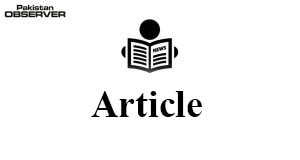Why quality education is in doldrums?
FOR any nation to grow economically, their education system needs to be in better shape. All the advanced countries have best education system to offer to their kids in continuity for securing the better world for them to live and thrive on.
The Cambridge system or the Oxford system, have gained the popularity worldwide and is known for their effectiveness.
But for surely, what ever the system is to be followed, its implementation and evaluation process is always on top priority for its success.
Worldwide for now, the self-evaluation of growth of school, culture change within the school and output objective in education measures are the success story of the school.
We may have the best system prevalent in the schools, but their success ratio is directly proportional to its success in self review.
The schools need to self-evaluate themselves to explore the avenues to grow and to fill in the deficiencies in the system.
For self-review, the leaders and teachers of the school need to play important role. For the reasons that teachers and school leaders are the key change agents for improvement in overall educational system.
The problem with the current system of education is not infrastructure or quality of teachers. The problem is human resource management, and missing link of proper internal and external evaluation of the school and college run by the Government.
All over the world, education management is science which is improvised each year with certain modifications after the thorough research analysis.
Irony is throughout all these years, only focus has been to dole out budget and hire qualified teachers which is though a good job in every way, yet the much needed reforms to bring about quality education are yet far from desired goal.
Your school may be highly braced with modern furniture and equipment and the qualified teachers and still we may fall very far behind in matching the quality of education imparted through reputable private educational systems.
Unfortunately, in Sindh in particular, we don’t find any cohesive system prevalent which gives feedback to policy makers or school leaders after yearly evaluation of their teachers and educational output of the school at macro or micro level.
The focus currently lies on recruitment of teachers on merit basis and to ensure the presence of teachers at school premises to rule out ghost teachers for which bio-metric system is in vogue after hefty investment in gadgets.
The fact that how good and competent teacher, the government may hire but their efficiency if remained unchecked through evaluation, the school is likely to fail to produce the desired objectives. The link of self-evaluation system is missing across the govt-run schools.
There is a need to introduce the School Effectiveness research (SER) which covers the whole school level performance and School Improvement (SI) which focuses on teacher’s work and school processes. Here we focus this write-up on methodology of introduction of School Improvement (SI) research.
The practice is mainly targeted to make the school “better” place for kids and the wider community at large. The approach capillarity includes the basics of understanding the methodologies and reflection of the overall culture change for the improvement.
The school has to create conducive environment in support to bring change in the students results through focus on teaching and learning processes.
The teachers and students are the part and parcel of the change agent. Moreover, seen in the context of large picture, every individual in the school has some contribution to make for the improvement of school.
To gain the required result for improvement, the important component of successful program is availability of resources to bring about desired change.
For the improvement in the school, things are required to be done in various phases. First phase includes the programme for intervention at the micro level and highlight the importance of change in culture in change process.
The school discipline, attitude of teachers and students, display of high moral during the school and quality in imparting education require systematic change and continuous process is a must.
In phase two, teachers action research, their command in teaching and follow up the set guidelines for lesson plannings, teaching methodologies, self-evaluation whether internal or external to gauge the output of students is required. This may be attained through exhaustive training programme at district level on a yearly basis.
The training imparted through comprehensive programme which may cost less and bring about more productivity among teachers should be essential component of success story of any school.
Phase three builds up the emerging scenario of knowledge base in the school. It sees the school as a unit of change. The approaches in both ways, at classroom management and overall organization improvement will require to be continued process.
Though, every Government has made an effort to implement the evaluation system for school education, yet the result has either been limited in its scope or implementing process has consistently failed.
Further, the major component which can bring quality education has seen utter failure while implementing the process.
There are institutions working on project at Government level, but their presence is not felt when it comes to output as a result of follow up of the process. The recent IBA test for the recruitment of teachers has divulged open the lowest level of quality education in the province.
For the last ten years we have witnessed merit based hiring of teachers in the school but still we fail in bringing change to school culture in its entirety.
The task is huge and the change is a must, now it is left to big wigs at policy whether they wish to see negative or positive curve in uplifting the quality of education in the province. For certain, it is time to act without further delay!
—The writer is Civil Servant.










